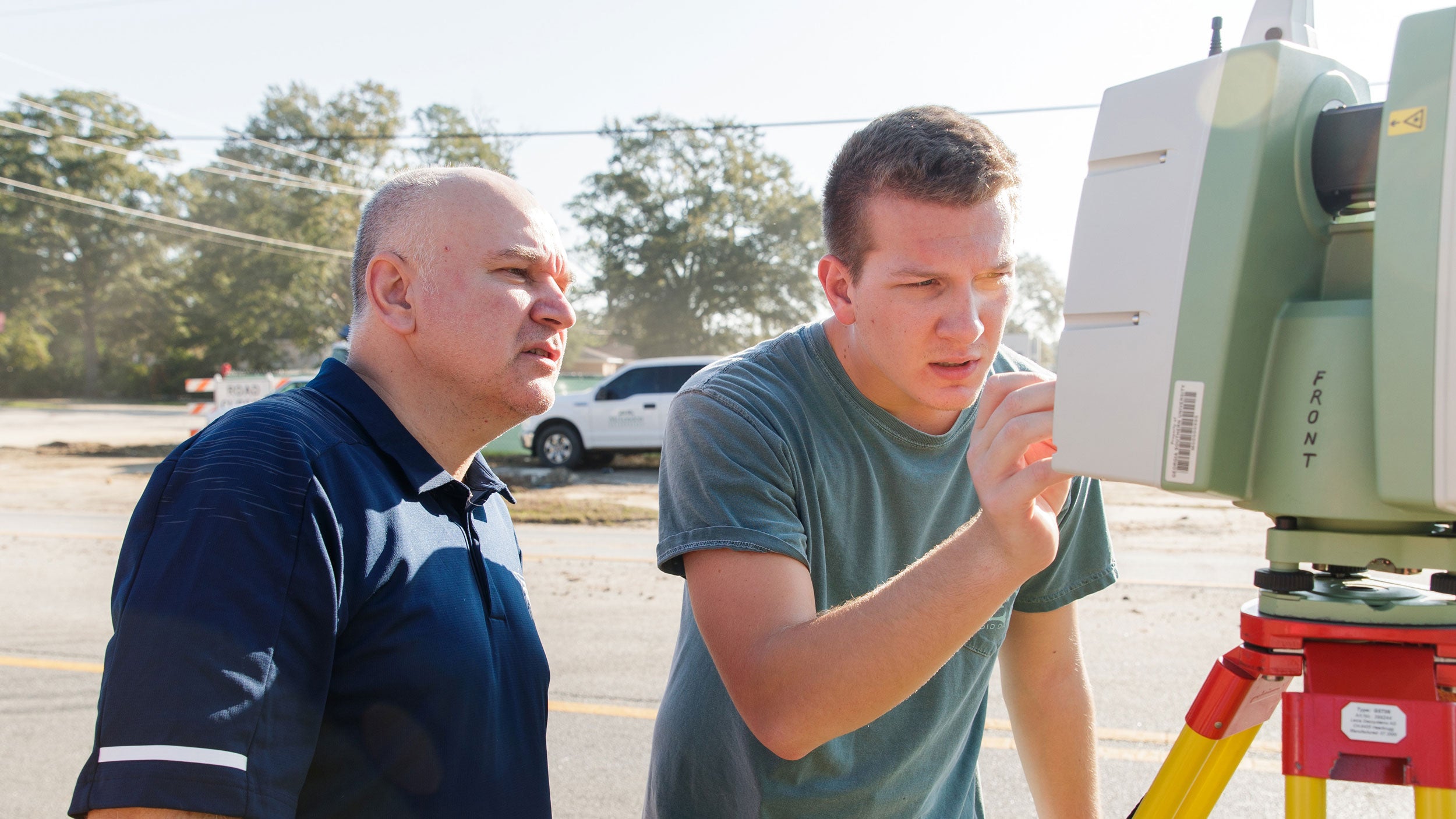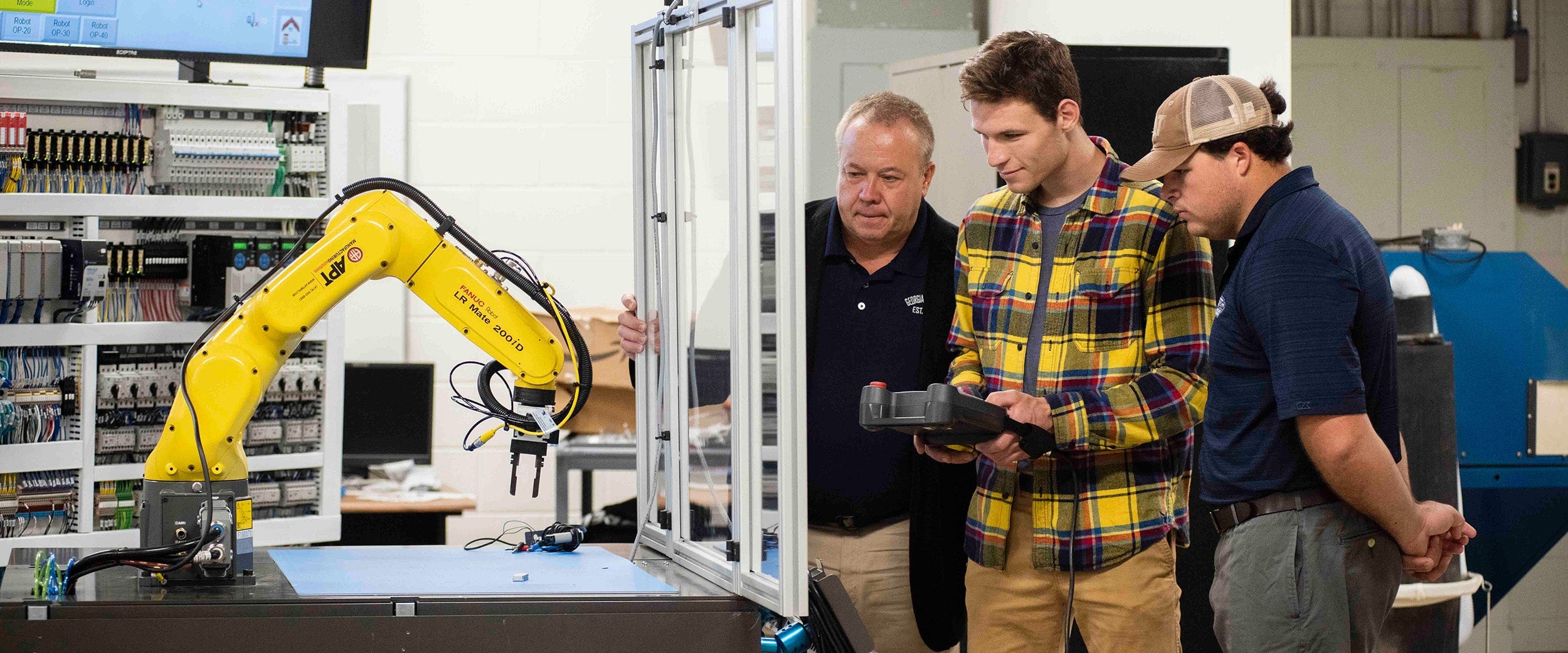Accelerate your career as a civil engineer, upgrading your knowledge and gaining real-world, results-driven experience for your next opportunity.
Locations
- Statesboro Campus (In Person)
Why Earn a Master’s in Civil Engineering at Georgia Southern?
- Real-world field studies and research on regional infrastructure let you collaborate with the area’s institutions and professionals.
- Build familiarity with leading technologies in well-equipped labs.
- Benefit from personalized attention with small class sizes.
- Work alongside faculty in research projects and contribute to innovation in the discipline.
- 30 credit hours to completion.
Reach a new stage in your career with a Master of Science (MS) in Civil Engineering from Georgia Southern University. You’ll prepare for the multifaceted and technology-driven world of infrastructure and construction as you practice with industry-standard tools and software in the classroom and the lab. Adding authority to your résumé, you’ll work on public impact research and projects that solve real infrastructure problems, employing the latest engineering technologies to get it done.
With a focus on practical experience, the master’s in civil engineering program couples job-ready skills with cutting-edge research abilities to equip you for your field of interest. And in and out of the classroom, faculty heavily involved in industry and research empower you to excel — wherever you’re headed next.
Ready to Apply?
What Can You Do With a Master’s in Civil Engineering?
Your studies furnish you with a new level of expertise and technical prowess that prepares you for roles with greater responsibility and higher pay: for example, supervisory and research positions in diverse areas of construction and infrastructure management. As you think beyond, developing a thesis gives you an edge in pursuing doctoral studies and an academic career.
Where our graduates work:
- Distinct Engineering Solutions, Inc.
- E-ONE Emergency Vehicles and Rescue Trucks
- Marks, Inc.
- Midstream and Terminal Services
- Terracon
- Thomas & Hutton
What our graduates do:
- Construction manager
- Engineering manager
- Geotechnical engineer
- Staff engineer
- Structural engineer
- Transportation engineer
What You’ll Learn
The master’s in civil engineering curriculum is built around five specialization areas: construction engineering, environmental/water resources engineering, transportation-pavement/geotechnical engineering, structural engineering and surveying-geomatics. After choosing one, you’ll build in-depth expertise and fine-tune your training through a vast selection of electives.
Your studies culminate in independent work, supervised by a faculty advisor, that enables you to apply what you’ve learned and gain valuable experience. Pick the thesis track to write and defend a substantial paper based on your research. Or, go with the non-thesis track to undertake a project in applied engineering.
See the CurriculumProgram Formats
Customize your training to fit your career direction. Choose a thesis to prepare for research or Ph.D. programs or the non-thesis option to enhance your professional qualifications in a specific area.
Thesis
Structure and collect data for a formal research project conducted under individual faculty guidance. You’ll craft and publicly defend a written thesis on the basis of your investigations, gaining strategic experience for further studies.
Non-Thesis
Follow your curiosity in a unique direction, completing your studies by designing an experiment, investigating a topic or partaking in independent research that will strengthen your résumé and build your expertise.
Specialization Areas
Select one of the program’s five specialization areas to focus your training, build a depth of expertise and access new opportunities.
Construction Engineering
Learn advanced analysis and design, project planning, scheduling and management of large-scale construction efforts, preparing for residential, commercial and civil projects such as roadways, bridges, ports and more.
Environmental/Water Resources Engineering
Prepare to solve current, relevant problems affecting water quality and sustainability. Study drinking water and wastewater treatment, surface water management, watershed management and related engineering topics.
Transportation-Pavement/Geotechnical Engineering
Examine the characteristics of soil, rock and asphalt as you delve into the design and construction of pavements, foundations and other earth structures, including how to employ sustainable materials.
Structural Engineering
Train to analyze and design large-scale infrastructure. You’ll gain experience with resistance factor design (LRFD), the repair and rehabilitation of civilian infrastructure, and cutting-edge forensic analysis tools.
Surveying-Geomatics
Navigate the geospatial world using geographical information systems, LiDAR, enhanced photogrammetry, advanced global positioning systems and other emerging technologies while completing the required coursework for a Professional Surveying License in Georgia.
Build Your Experience
Gain facility with the technologies and practices at the forefront of contemporary civil engineering, moving beyond a theoretical understanding to build your confidence through real-world applications.
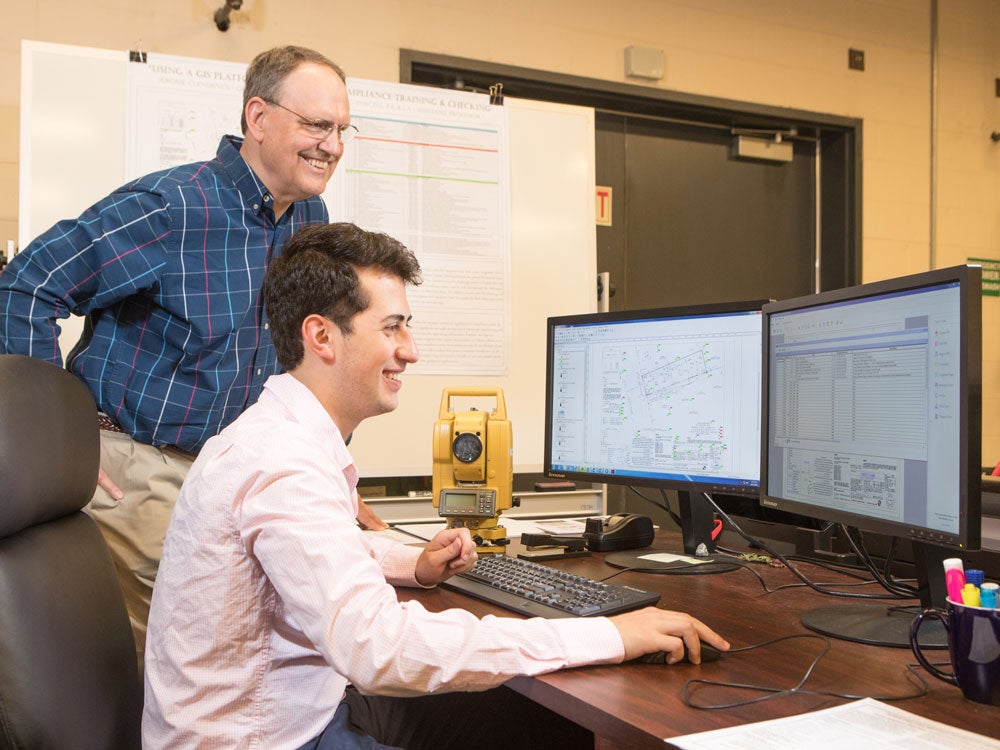
Research
Immerse yourself in an environment of innovation, joining faculty in specialized facilities to advance our understanding of remote sensing, water resource management, structural deterioration, transportation infrastructure and many more areas.
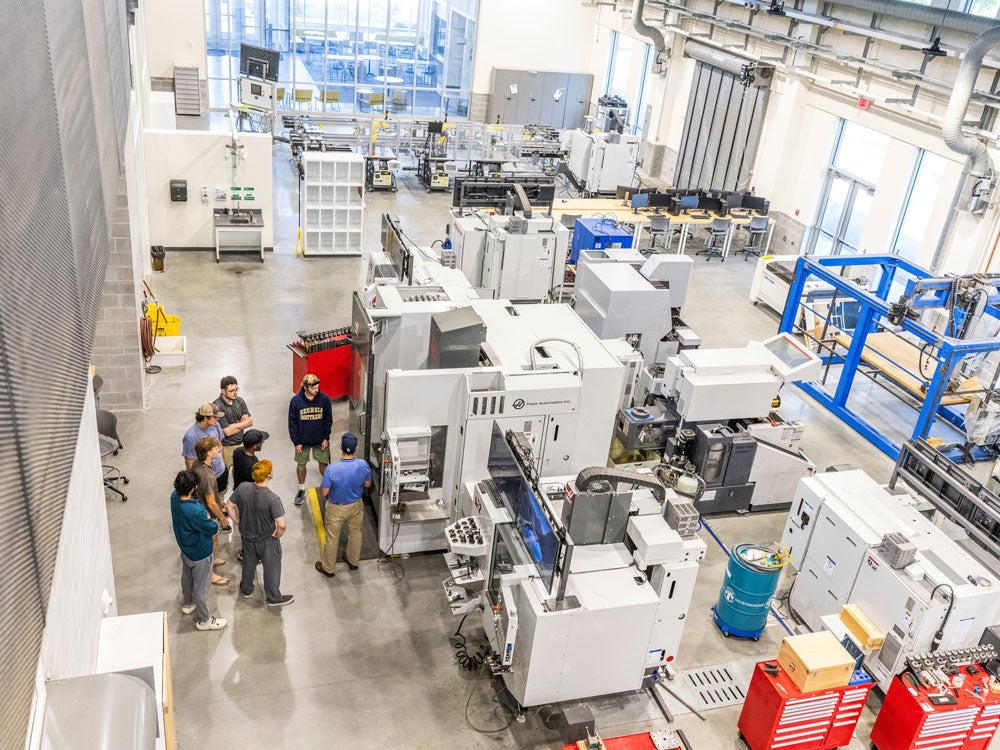
Facilities and Technologies
Develop your skills with the latest technologies as you acquire extensive experience with tools and techniques like laser scanning, ultrasonic pulse velocity, nondestructive testing, gas chromatography and drone-aerial photogrammetry.
Want to Learn More?
Explore essential information about our MS in Civil Engineering program, including application details, accreditation status, and licensing disclosures. Gain insight into the program’s credibility and requirements to help you start your journey toward success with the knowledge you need.
Applicants for the MS in Civil Engineering program must have completed a bachelor’s degree in civil engineering or a related field at a regionally accredited institution with a minimum cumulative GPA of 3.0 (on a 4.0 scale).
To apply, please submit:
- An online application. (There is a $50 nonrefundable application fee.)
- Official English language test scores (TOEFL or IELTS; required only for international applicants whose native language is not English).
All supporting materials should be submitted directly to the Office of Graduate Admissions at gradadmissions@georgiasouthern.edu.
International transcripts must be evaluated by a NACES-accredited evaluation service. The evaluation must be course-by-course and include a GPA.
Application Deadlines
Students are admitted to begin in the fall and spring semesters. The application deadlines are as follows:
| Fall | Spring | |
|---|---|---|
| Priority Deadline | March 1 | October 1 |
| Final Deadline | July 1 | November 15 |
Your application and all required documents must be received by the deadline.
Provisional Admission
Applicants may be approved for provisional admission based on the quality of the admission material presented. Provisional students must earn grades of “B” or higher in their first nine hours of coursework after admission and meet any other stipulations outlined by the Department to be converted to regular status.
Contact Information
Dr. Francisco Cubas
Graduate Program Director
fcubassuazo@georgiasouthern.edu
912-478-1894
Graduate Assistantships to help offset program costs are offered on a competitive basis. Duties might include grading, coordinating lab activities or assisting with research. Graduate assistants must be registered for a minimum of nine credit hours of graduate coursework, of which six hours must count toward their degree. If you’re interested, complete the Graduate Assistantship Application.
General questions about admission, graduate assistantships, and requests for application materials and catalogs should be directed to the College of Graduate Studies.
Graduate AssistantshipsFaculty Feature
Learn from faculty moving the discipline forward. Professor Junan Shen, Director of the Asphalt Research Lab, leads colleagues and students in formulating novel materials for the infrastructure of the future.
Learn More About Professor Shen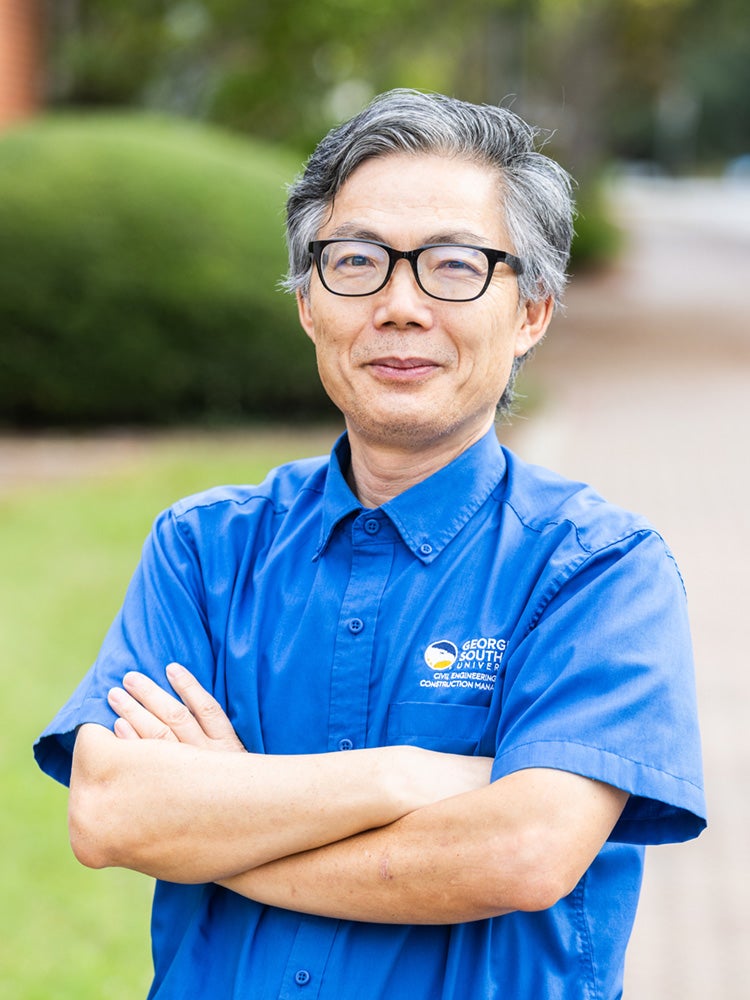
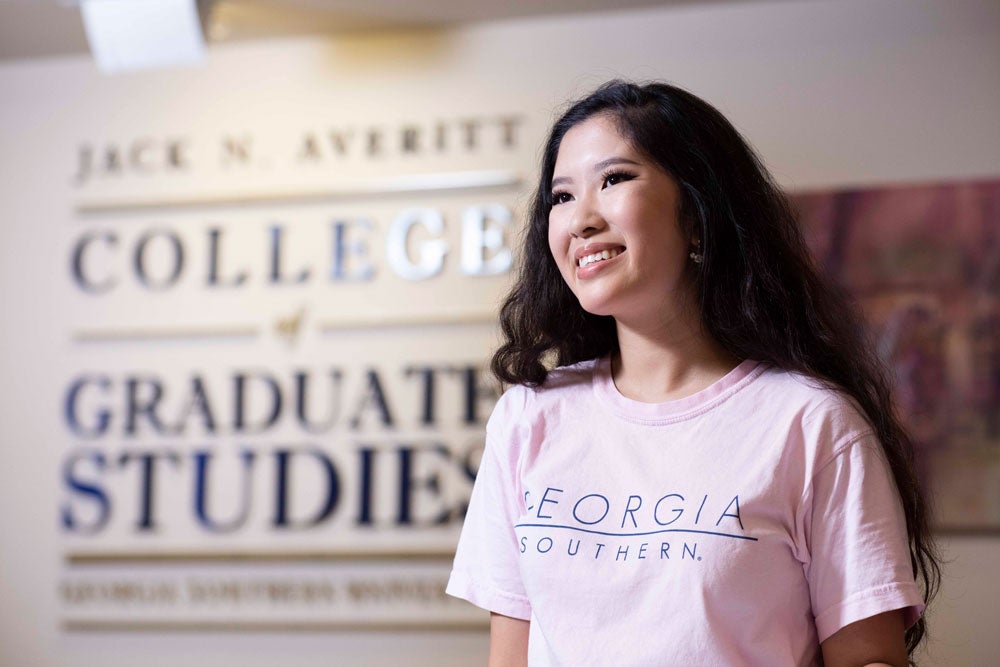
Take the Next Step
Discover an environment of practical, tech-driven innovation at Georgia Southern as you prepare for the next phase of your civil engineering career.
Contact Us
Graduate Coordinator
Francisco Cubas, Ph.D.
Phone: 912-478-6453
Email: fcubassuazo@georgiasouthern.edu
Graduate Admissions
Phone: 912-478-5384
Fax: 912-478-0740
Email: gradadmissions@georgiasouthern.edu

